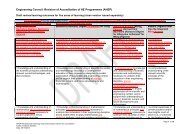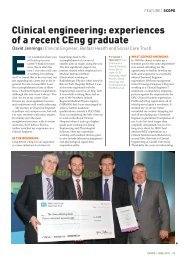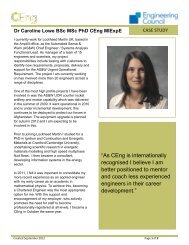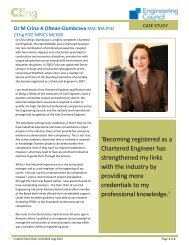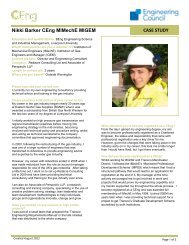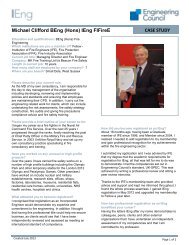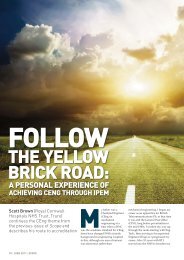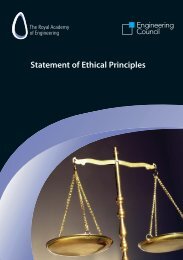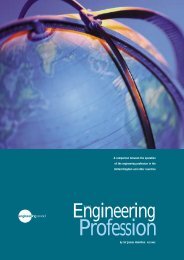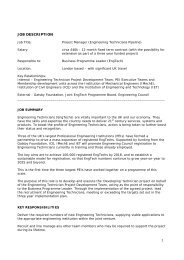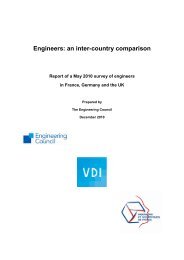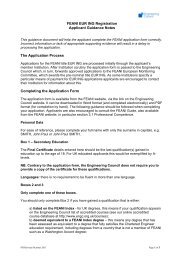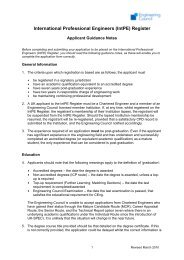An Engine for Change - A Chronicle of the Engineering Council
An Engine for Change - A Chronicle of the Engineering Council
An Engine for Change - A Chronicle of the Engineering Council
Create successful ePaper yourself
Turn your PDF publications into a flip-book with our unique Google optimized e-Paper software.
66A CHRONICLE OF THE ENGINEERING COUNCILeducation authorities, teacher organisations and o<strong>the</strong>rs active in this field. Pupils, parents andteachers were all told <strong>of</strong> employment opportunities in engineering within four broadgroupings: Multi-skilled Craftspeople, <strong>Engine</strong>ering Technicians, Incorporated <strong>Engine</strong>ers andChartered <strong>Engine</strong>ers. Five engineering categories were used, broadly based upon <strong>the</strong> EngC’sfive Executive Group Committees:civil, structural, construction and building services;manufacturing systems, mechanical and production;electrical, electronic and in<strong>for</strong>mation technology;process industries such as food, chemicals and minerals;transport.Also aimed at young people, a careers’ pamphlet ‘<strong>Engine</strong>ering <strong>for</strong> People’ was developedduring 1988 explaining how teenagers could become involved in <strong>the</strong> teamwork <strong>of</strong> modernengineering, and at <strong>the</strong> same time drawing attention to <strong>the</strong> fact that pr<strong>of</strong>essional engineerswere well paid.In February 1988 <strong>the</strong> EngC, jointly with <strong>the</strong> Society <strong>of</strong> Education Officers, produced astatement ‘16-19 Education and Training’. This aimed to give this age group a broader andmore balanced experience in education and training. By welcoming routes o<strong>the</strong>r than A-Levelit also indicated a wider gateway into higher education.On <strong>the</strong> Government’s National Curriculum Design and Technology Working Group, chairedby Lady Margaret Parkes, <strong>the</strong> EngC was represented by <strong>the</strong> Director General, Denis Filer.The Group’s report was issued during 1989 and accepted by <strong>the</strong> Secretary <strong>of</strong> State. As aconsequence <strong>the</strong> EngC’s Director – Industry and Regions, Graham <strong>An</strong>thony, was invited by<strong>the</strong> School Examination and Assessment <strong>Council</strong> to join <strong>the</strong> Committee on Technology.Following up on <strong>the</strong> National Curriculum, a conference was organised by <strong>the</strong> EngC in July1989 and held in Lincoln <strong>for</strong> initial teacher trainers, local education authority advisers andinspectors to consider Technology in <strong>the</strong> National Curriculum <strong>for</strong> primary schools.Contributors included Nick Stuart, Deputy Secretary <strong>for</strong> <strong>the</strong> DES and Jim Rose, ChiefInspector, HMI. Implications <strong>for</strong> training at national and local levels, implications <strong>for</strong>classroom practice, mechanisms <strong>for</strong> implementing change, and <strong>the</strong> provision <strong>of</strong> resourcesfrom industrial links were debated by reviewing <strong>the</strong> report <strong>of</strong> <strong>the</strong> Design & TechnologyCurriculum Working Group.‘<strong>Engine</strong>ering <strong>the</strong> Future – A view from <strong>the</strong> Schools’ was published in January 1990 by <strong>the</strong>EngC with <strong>the</strong> Secondary Heads’ Association to re<strong>for</strong>m courses <strong>for</strong> 16-18 year olds as aresult <strong>of</strong> <strong>the</strong> National Curriculum being introduced into all schools in <strong>the</strong> UK.Recommendations were made as to how <strong>the</strong> Government could address <strong>the</strong> on-going shortage<strong>of</strong> science and ma<strong>the</strong>matics teachers. Then in May, to stimulate industrial employers to helpschools teach technology as part <strong>of</strong> <strong>the</strong> National Curriculum, Unilever, with <strong>the</strong> NationalCurriculum <strong>Council</strong> and <strong>the</strong> DTI, sponsored a booklet ‘Creating <strong>the</strong> Future’; this waspublished jointly by <strong>the</strong> EngC and <strong>the</strong> Standing Conference on Schools, Science andTechnology (SCSST) and was distributed to 25,000 companies after <strong>the</strong> DES published <strong>the</strong>Statutory Orders <strong>for</strong> Technology in 1990. In November <strong>the</strong> EngC published a seminar report‘Accommodation Resources to Teach Science and Technology in <strong>the</strong> National Curriculum’.© <strong>Engine</strong>ering <strong>Council</strong> UK 2004



